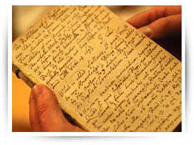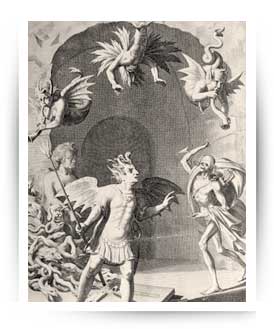Campaign Priorities:
Rare Books and Unique Collections
Researching the Past
 How far do you think you would have to travel to view the personal, working library of Leonard and Virginia Woolf, she being one of the major literary figures of the twentieth century? To research firsthand the history of such contemporary issues as animal welfare and the human-animal connection? To examine more than 500 different copies of the Compleat Angler by Izaak Walton, including all of the 17th century editions?
How far do you think you would have to travel to view the personal, working library of Leonard and Virginia Woolf, she being one of the major literary figures of the twentieth century? To research firsthand the history of such contemporary issues as animal welfare and the human-animal connection? To examine more than 500 different copies of the Compleat Angler by Izaak Walton, including all of the 17th century editions?
These rich collections, and many others, are housed in Manuscripts, Archives, and Special Collections (MASC) in the Terrell Library in Pullman. There are currently 53,000 rare book housed MASC but it is not a museum. These rare books and other unique resources are consulted regularly by students, scholars, and community members alike for academic and personal research. They are also incorporated into numerous WSU courses offered in English, History, and Fine Arts.
Why are Rare Books Important?
The study of rare volumes provides us with a type of time machine through which we have an unusual opportunity to commune with the past.  Books printed during the hand-press period (1453-1800) are imperfect objects. The complexity of the process - setting type, inking pages, and binding pages - ensures that no two early printed books are exactly the same.
Books printed during the hand-press period (1453-1800) are imperfect objects. The complexity of the process - setting type, inking pages, and binding pages - ensures that no two early printed books are exactly the same.
When students examine an early text in MASC, such as Milton’s Paradise Lost, (at right) they touch the very artifact that English readers would have experienced in the 17th century. They can imagine what Milton himself might have seen in a book store.
-
“The Rare Books collection at MASC provides me with the opportunity to show my students what a text looks like in its original format. Furthermore, the variety of books – ranging from seventeenth century travel narratives to twentieth century popular fiction – enables me to communicate the cultural and historical context of a novel. Whether it is images of Sluggarts and Iron Pigs from South America or Sea Horses and Sea Lions from the Arctic Circle, rare books offer a glimpse of the ideas and concepts that shaped an author’s worldview.”
Nora L. Wiechert, PhD, WSU 2009
“When we pick up an early printed book, we pick up the traces of past readers and enter into a conversation that began centuries before we opened the volume and will continue long after we have closed its covers.”
Andrew McCarthy, WSU PhD Candidate
Heading using the h3 tag
Lorem ipsum dolor sit amet, consectetur adipisicing elit, sed do eiusmod tempor incididunt ut labore et dolore magna aliqua. Ut enim ad minim veniam, quis nostrud exercitation ullamco laboris nisi ut aliquip ex ea commodo consequat. Duis aute irure dolor in reprehenderit in voluptate velit esse cillum dolore eu fugiat nulla pariatur. Excepteur sint occaecat cupidatat non proident, sunt in culpa qui officia deserunt mollit anim id est laborum.
